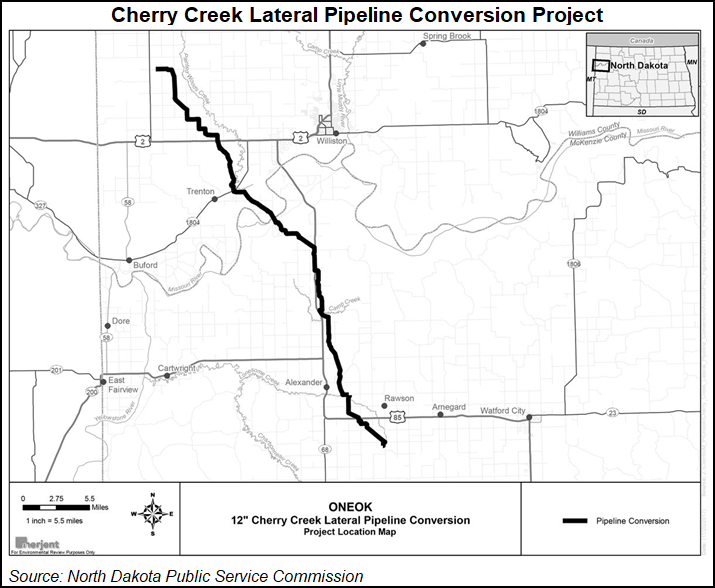Bakken Shale | NGI All News Access | NGI The Weekly Gas Market Report | Regulatory
North Dakota PSC Approves One Bakken NGL Pipeline, Sets Hearing For Another
The North Dakota Public Service Commission (PSC) has given its approval to an application for one natural gas liquids (NGL) pipeline and set a hearing to debate another later this month.

During a special meeting late Monday, the PSC gave unanimous approval to Oneok Rockies Midstream LLC’s proposal to convert an existing natural gas gathering pipeline in McKenzie and Williams counties to a transmission pipeline capable of transporting 50,000 b/d of natural gas liquids [PU-17-483]. Estimated cost of the project is $31 million.
The 45-mile long, 12-inch diameter Cherry Creek pipeline would transport NGLs produced at Oneok’s Lonesome Creek Gas Plant in McKenzie County to Oneok’s Stateline Gas Plant and delivered into the Oneok Bakken Pipeline NGL transmission line, according to the application.
Oneok still needs a revised permit from the U.S. Army Corps of Engineers for a proposed Missouri River crossing before it can progress with the project, according to Commissioner Julie Fedorchak.
In February, Oneok Inc. said it planned to invest $2.3 billion by 2020 on projects including a Midcontinent-to-Gulf Coast NGL pipeline, a fractionation facility in Mont Belvieu, TX, and a natural gas processing plant in North Dakota. That announcement came just weeks after Oneok said it would spend $1.4 billion to build the Elk Creek NGL pipeline stretching 900 miles from the Rocky Mountains to its existing Midcontinent facilities, which serve Oklahoma’s producers in the STACK and SCOOP, i.e., the Sooner Trend of the Anadarko Basin, mostly in Canadian and Kingfisher counties, and the South Central Oklahoma Oil Province.

Also on Monday, the PSC scheduled a public hearing May 14 regarding Andeavor Field Services LLC’s proposal to build an NGL pipeline system in McKenzie, Billings and Stark counties. Estimated cost of the project is $46 million. Andeavor is seeking a permit to build 44 miles of six-inch and eight-inch steel pipelines in three segments:
The North and South segments would interconnect using 42 miles of the previously permitted BakkenLink Pipeline. They would initially carry up to 15,000 b/d with expansion capacity up to 34,000 b/d. The Transfer Segment would have normal throughput of 7,200 b/d with maximum capacity of 43,000 b/d.
© 2024 Natural Gas Intelligence. All rights reserved.
ISSN © 2577-9877 | ISSN © 1532-1266 | ISSN © 2158-8023 |
